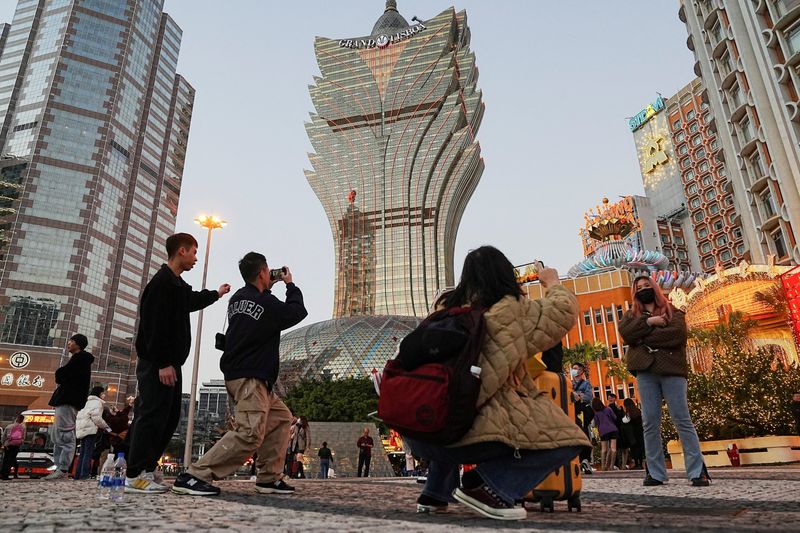By Farah Master
HONG KONG (Reuters) - Macau posted an 82.5% year-on-year rise in gambling revenue to 11.6 billion patacas ($1.4 billion) in January, after the world's biggest gambling hub had nearly half a million visitor arrivals over the week-long Lunar New Year holiday.
The crowds were the biggest in more than three years, but January's revenue was still less than half of the Lunar New Year period in 2019 prior to the COVID-19 outbreak, according to data released by Macau's government on Wednesday.
Still investors took cheer, sending shares in Macau casinos up between 3% to 5%, while executives and analysts said it was an encouraging sign of a solid recovery to come.
A special administrative region of China, Macau has seen a resurgence of tourists from the mainland since Jan. 8 after the territory dropped all COVID-19 testing requirements for inbound travellers from the mainland, Hong Kong and Taiwan.
Tens of thousands of tourists streamed daily into Macau's casinos and picturesque cobbled streets over the Lunar New Year holiday from Jan. 21, a stark contrast to the dearth of visitors into the former Portuguese colony since 2020.
Macau is the only place in the country where gambling in casinos is legal. It had closely followed China's zero-COVID strategy since 2019 and re-opened alongside the mainland.
January's revenues were the first for Sands China (OTC:SCHYY), Wynn Macau (OTC:WYNMF), MGM China (OTC:MCHVY), Galaxy Entertainment, MGM China and SJM Holdings (OTC:SJMHF) under new 10-year contracts.
The casinos had launched under 20-year contracts in 2002, raking in billions of dollars and turning a sleepy fishing village into a glitzy boomtown.
The new contracts, with more government oversight and control, were struck after COVID-19 restrictions decimated Macau's gambling revenues and sent net debt soaring. The industry had its worst revenue performance on record in 2022.
The city's once lucrative VIP industry has also collapsed following several arrests in Macau's junket industry. A Macau court on Jan. 18 sentenced Alvin Chau, one of the city's most well-known figures, to 18 years in prison.
NEW ERA
Casinos have committed to investing a total of $15 billion in the coming decade, 90% of which must be spent on developing non-gaming plans that include an indoor waterpark, health and wellness centres, art exhibitions and a large garden attraction by Sands, similar to Singapore's Gardens by the Bay.
Stakes are high as to whether they can successfully deliver on a government mandate to increase non-gaming revenues to more than 30% versus of the total versus an average of 5% pre-COVID.
In Las Vegas, around 50% of revenues are non-gaming.
Rob Goldstein, chairman and chief executive of Las Vegas Sands (NYSE:LVS), majority owner of Sands China, said the company was seeing a very strong recovery in Macau since the lifting of COVID restrictions.

"We're just thrilled to be open and making money and seeing demand like we're seeing," he told an analysts call last week.
However, labour shortages are becoming apparent as resorts and retail stores rush to boost staff to keep up with demand, and a Sands executive said it was not operating some hotels at full capacity as a result.